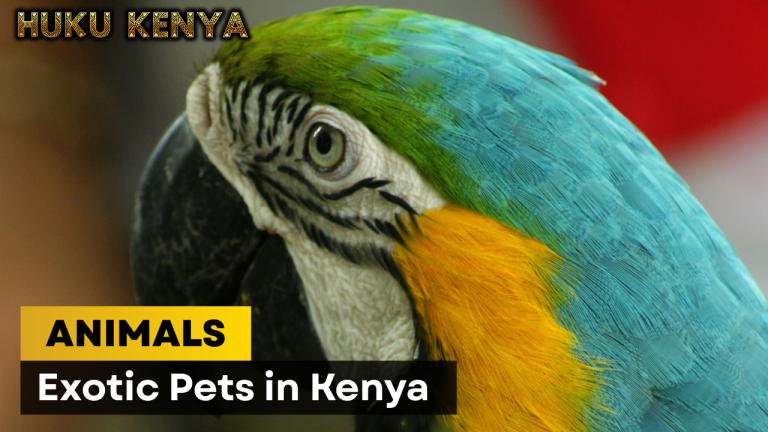
What’s Legal, What’s Banned, and What’s Ethical?
Understanding the laws, risks, and responsibilities of owning non-domesticated animals in 2025
In 2025, Kenya’s fascination with exotic pets—from snakes and parrots to tortoises and chameleons—is growing rapidly. But so are the legal, ethical, and ecological concerns surrounding their ownership. While some species are legally bred and sold, others are banned due to conservation risks, public health threats, or cruelty concerns. This article explores what’s allowed, what’s prohibited, and what ethical questions arise when wild animals become household companions.
1. What Counts as an Exotic Pet?
Exotic pets are animals that are non-domesticated, often non-native, and typically not bred for companionship. In Kenya, this includes:
- Reptiles: snakes, tortoises, geckos
- Amphibians: frogs, newts
- Birds: parrots, macaws, owls
- Mammals: monkeys, sugar gliders, hedgehogs
- Insects and arachnids: tarantulas, stick insects, queen ants
These animals differ from traditional pets like dogs, cats, rabbits, or livestock in terms of care, legal status, and ecological impact.
2. What’s Legal in Kenya?
Kenya permits ownership of certain exotic species under strict conditions, especially if they are captive-bred and not endangered.
Legal Ownership Requires:
- Permits from Kenya Wildlife Service (KWS) for protected species
- Proof of captive breeding (not wild-caught)
- Compliance with CITES regulations for international trade
- Registration with county veterinary offices for transport and sale
Commonly Legal Exotic Pets (with permits):
- African grey parrots (captive-bred only)
- Leopard geckos
- Ball pythons
- Indian ringneck parakeets
- Red-eared slider turtles
3. What’s Banned or Restricted?
Kenya has banned or restricted ownership of several exotic species due to conservation, cruelty, or public health concerns.
Banned or Restricted Species:
- Wild-caught chameleons and tortoises: Often trafficked and suffer high mortality rates
- Primates (e.g. vervet monkeys): High risk of zoonotic disease and behavioral issues
- Venomous snakes: Prohibited for private ownership due to safety risks
- Otters and pangolins: Protected under the Wildlife Conservation and Management Act (2013)
- Queen ants and rare insects: Trafficking cases prosecuted under wildlife laws
Legal Penalties:
- Fines up to KES 1 million or 1 year imprisonment for illegal possession
- Seizure of animals and revocation of permits
- Prosecution under CITES, WCMA, and Animal Welfare laws
4. Ethical Concerns of Exotic Pet Ownership
Even when legal, exotic pet ownership raises serious ethical questions.
Key Issues:
- Animal suffering: Many exotic pets die in transit or suffer in captivity due to poor care4
- Ecological disruption: Removal of wild animals can destabilize ecosystems
- Captive breeding flaws: Inbreeding and poor conditions lead to deformities and disease
- Human health risks: Zoonotic diseases like salmonella and herpes B virus can spread from exotic pets
Ethical Guidelines:
- Avoid wild-caught animals
- Ensure proper habitat, diet, and veterinary care
- Choose domesticated alternatives when possible
- Support conservation rather than private ownership
5. Regulatory Framework in Kenya
Kenya’s exotic pet trade is governed by a mix of national and international laws:
Key Laws and Agencies:
- Wildlife Conservation and Management Act (2013)
- Animal Welfare and Protection Bill (2024)
- CITES (Convention on International Trade in Endangered Species)
- Kenya Wildlife Service (KWS)
- County Animal Welfare Committees (under 2025 reforms)
Enforcement Trends:
- Increased prosecutions for insect and reptile trafficking
- Crackdowns on illegal breeding farms and pet markets
- Public education campaigns on ethical pet ownership
6. Alternatives to Exotic Pet Ownership
For those drawn to exotic animals, there are safer and more ethical alternatives:
- Visit accredited wildlife sanctuaries and zoos
- Support conservation groups working to protect endangered species
- Adopt domesticated pets whose needs can be met in home environments
- Participate in citizen science and wildlife monitoring programs
Conclusion
Exotic pet ownership in Kenya is a complex issue that blends legality, ethics, and ecology. While some species can be kept responsibly under strict regulation, many others are best left in the wild. As Kenya strengthens its animal welfare laws and conservation efforts, the public must also shift toward more informed, ethical choices. Owning an exotic pet is not just a personal decision—it’s a statement about how we value wildlife, biodiversity, and animal dignity.

























